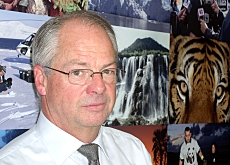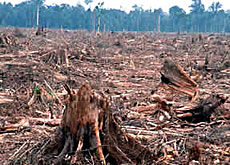WWF chief leaves dire warning for the planet

Many nations – including Switzerland – are too scared to "bite the bullet" over global warming, Claude Martin, outgoing head of WWF International, tells swissinfo.
The Swiss, who has led the global conservation organisation for the past 12 years, says the failure to mitigate the effects of climate change will have devastating social, environmental and economic consequences.
swissinfo: You recently described George Bush as “a menace to the planet”. As long as he remains in charge of the world’s most powerful nation, what hope is there of effective progress on conservation and the environment?
Claude Martin: I think we should distinguish between the influence of a government headed by somebody like George Bush and the fact that possibilities always exist, not least in developing countries themselves.
We have a tendency to look at the world purely from the perspective of some of our northern countries when in fact a lot of conservation and environmental solutions are being worked on by developing countries. So one shouldn’t create the impression that a single individual like George Bush decides everything. But having said that, of course his politics and policies pull in exactly the wrong direction to our point of view.
swissinfo: Climate change is one of the WWF’s key priorities but there are still those who dispute the effects of global warming. You also face opposition from big business. Aren’t the odds stacked too heavily against you?
C.M.: I think there may be the odd individual out there who still contests that it is happening but no one takes them seriously any more. I think any serious government – even the US – has to admit that something strange is happening.
If you look at the projections for the next 30, 40, 50 years, it is very evident what needs to be done and there is general agreement on this: a serious, serious reduction in CO2 emissions. But one of the things that frustrates me most is that whenever it comes to biting the bullet, our politicians are nowhere to be seen.
I would not throw all business into the same pot. Here you have exactly the same kind of biodiversity as you have among NGOs [non-governmental organisations]. You have black sheep and white sheep, and I think many businesses have realised that climate change is a long-term threat to their business. If you talk to a reinsurer like Swiss Re, they understand what the challenges are.
swissinfo: At the beginning of October the Swiss government imposed a climate levy of 1.5 centimes on every litre of petrol and diesel. NGOs have criticised the move as a cosmetic exercise. What’s your view?
C.M.: This is a ridiculous sort of gesture. If you look at what this centime is doing, especially when you measure it against the increase in petrol prices, it’s a drop in the ocean. I don’t think this is the sort of climate policy that a responsible government in one of the richest countries of the world should undertake.
swissinfo: The Swiss are very strong on humanitarian issues but when it comes to climate change and fulfilling the Kyoto protocol targets they are way off the mark. Why is this?
C.M.: In the 1980s Switzerland was a leader in environmental terms but since then we have – at least at a legislative level – lost out. We are still a world leader when it comes to recycling glass and paper and things like that, but in terms of environmental policies we have slipped back very badly. I think this is to do with the fact that we currently have a largely rightwing government which does not take a long-term view.
swissinfo: The Swiss are due to vote in November on a five-year moratorium on genetically modified organisms (GMOs). Many people say they represent a means of reducing world hunger. Where do you stand on the issue?
C.M.: GMOs – soya, maize, cotton and all kinds of genetically engineered crops – are gaining a lot of ground in developing countries, and this is something we cannot just walk away from. Personally, I do not exclude that GMOs could one day play a role in combating hunger, but there are many aspects that need to be looked at first.
Regarding the moratorium in Switzerland where we have a speciality agriculture with farmers increasingly dependent on income from organic produce, I think this niche market should be protected and not jeopardised by the introduction of GMOs. I think the legislators have not done a good job in terms of limiting the potentially disastrous effects of genetically modified organisms.
swissinfo: As you step down after more than 30 years at the WWF, the world seems to be hurtling towards a future of extreme weather patterns, shrinking biodiversity, and food and water shortages. You must be delighted to be handing over to someone else…
C.M.: (Laughs) No, no. I am certainly not running away. But while we have won many battles, it is true that the long-term trend doesn’t look very good, particularly when it comes to the effects of climate change on biodiversity.
This is currently my gravest concern: that the world community isn’t serious enough about mitigating the effects of climate change. The long-term effects are going to be devastating – socially, environmentally and economically.
swissinfo-interview: Adam Beaumont
The WWF has six main areas of activity: climate change, forests, freshwater, marine, species and toxic chemicals.
The organisation has a network active in more than 90 countries.
Since 1985 the WWF has invested over $1.165 billion (SFr1.52 billion) in more than 11,000 projects in 130 countries.
James P Leape will take over as director general of WWF International in December 2005.
Zurich-born Claude Martin began his WWF career in the early 1970s, when he lived in Central India studying the ecology of the threatened barasingha deer in Kanha National Park.
From 1975-78 he served as director of several protected areas in western Ghana, before becoming director of WWF Switzerland in 1980.
He joined WWF International in 1990 as deputy director-general. He was appointed director general three years later.

In compliance with the JTI standards
More: SWI swissinfo.ch certified by the Journalism Trust Initiative

You can find an overview of ongoing debates with our journalists here . Please join us!
If you want to start a conversation about a topic raised in this article or want to report factual errors, email us at english@swissinfo.ch.